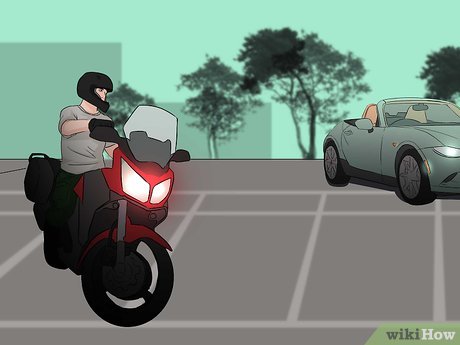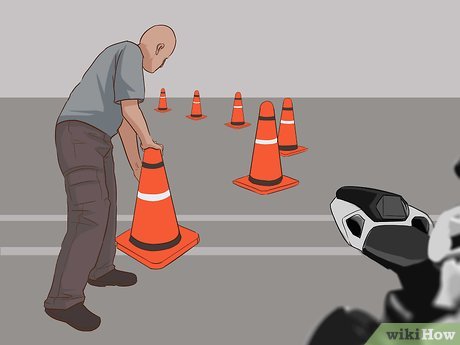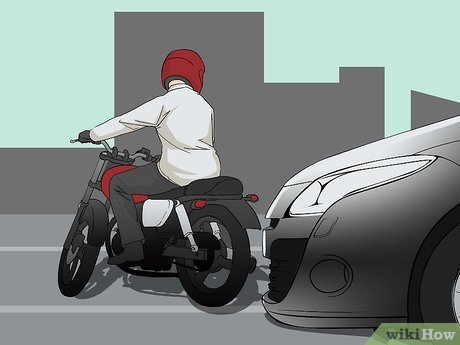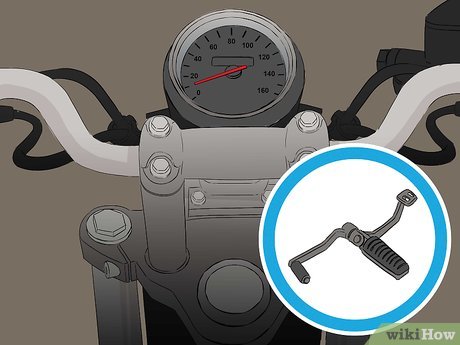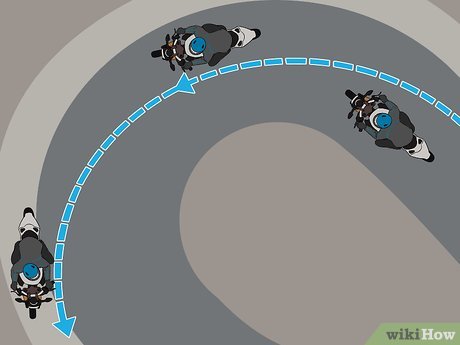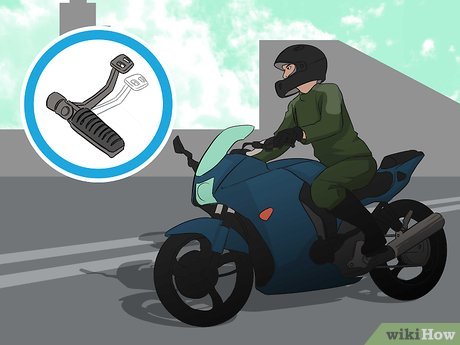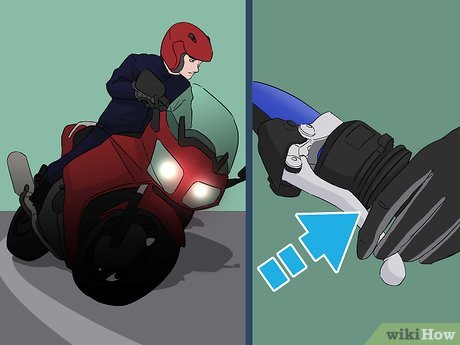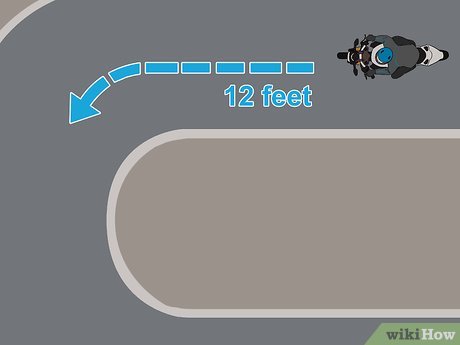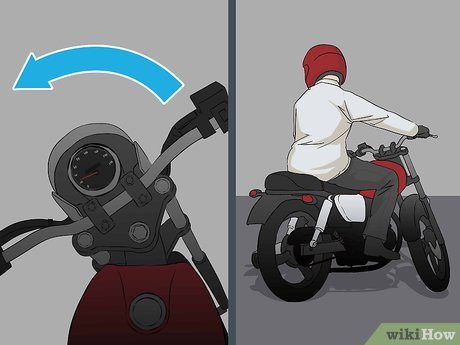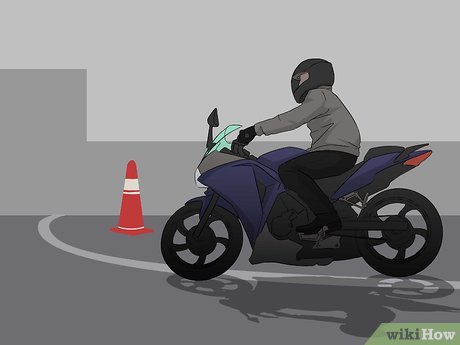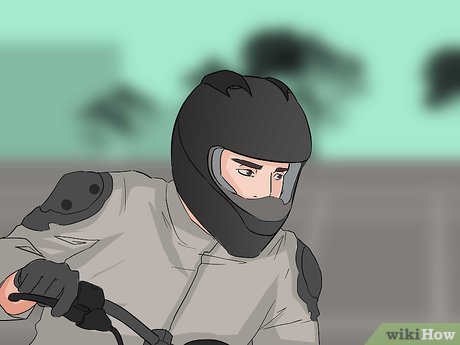How to U‐Turn on a Motorcycle
Part 1 of 3:
Setting Up a Practice Space
-
 Find a large, empty parking lot. It's wise to practice maneuvering a U turn in an empty parking lot before trying it on a street. An empty parking lot is a relatively forgiving environment, and you can U turn as slowly as you like without having to worry about other vehicles or drivers.[1]
Find a large, empty parking lot. It's wise to practice maneuvering a U turn in an empty parking lot before trying it on a street. An empty parking lot is a relatively forgiving environment, and you can U turn as slowly as you like without having to worry about other vehicles or drivers.[1]- It's best if the parking lot you practice in doesn't have much traffic. Scope out parking lots at shopping malls in your area. Large churches will also have big, empty parking lots 5 or 6 days a week.
-
 Set up cones to mimic the width of a turn lane. If you have a handful of traffic cones, set them up to create a practice 'lane.' Use half a dozen cones to mark the corners and center point of a lane 34 feet (10.4 m) (10.4 m) long and 24 feet (7.3 m) wide. Then, place two more cones about 12 feet (4 m) (3.7 m) from the end of your practice lane. These cones will serve as your 'pivot point,' and indicate when you should begin to pivot for the U turn.[2]
Set up cones to mimic the width of a turn lane. If you have a handful of traffic cones, set them up to create a practice 'lane.' Use half a dozen cones to mark the corners and center point of a lane 34 feet (10.4 m) (10.4 m) long and 24 feet (7.3 m) wide. Then, place two more cones about 12 feet (4 m) (3.7 m) from the end of your practice lane. These cones will serve as your 'pivot point,' and indicate when you should begin to pivot for the U turn.[2]- The majority of side streets are about 24 feet (7 m) (7.3 m) wide. So, this practice lane will prepare you for making a U turn in a turn lane or on a wide two-lane road.
-
 Practice U turns in the parking spaces. If you don't have cones, or would prefer not set up an elaborate training course, you can practice your U turns in the parking spaces themselves. In nearly all parking lots, parking spaces are 10 feet (3 m) wide. Start out by practicing the U turn across 3 parking spaces or 30 feet (9.1 m) (9m).[3]
Practice U turns in the parking spaces. If you don't have cones, or would prefer not set up an elaborate training course, you can practice your U turns in the parking spaces themselves. In nearly all parking lots, parking spaces are 10 feet (3 m) wide. Start out by practicing the U turn across 3 parking spaces or 30 feet (9.1 m) (9m).[3]- As you start feeling more adept, try the U turn within 2 parking spaces or 20 feet (6.1 m) (6m).
Part 2 of 3:
Approaching the U Turn
-
 Slow down and shift into first gear. If you approach a U turn going too fast, the maneuver will be much harder than it needs to be. You only need to be going between 5 and 10 mph to make a U turn. Shifting your bike into first gear will allow your engine to slow down your bike as well.[4]
Slow down and shift into first gear. If you approach a U turn going too fast, the maneuver will be much harder than it needs to be. You only need to be going between 5 and 10 mph to make a U turn. Shifting your bike into first gear will allow your engine to slow down your bike as well.[4]- Being in first gear will also allow you to quickly accelerate as you complete the U turn.
-
 Ride close to the curb you'll be turning away from. So, if you want to U turn to the left, pull up close to the right-hand curb. It's important that you pull close to the curb a few dozen yards in advance, so that you're riding in a straight line by the time you make the U turn. Riding next to the right-hand curb will give you plenty of room to swing your left U turn.[5]
Ride close to the curb you'll be turning away from. So, if you want to U turn to the left, pull up close to the right-hand curb. It's important that you pull close to the curb a few dozen yards in advance, so that you're riding in a straight line by the time you make the U turn. Riding next to the right-hand curb will give you plenty of room to swing your left U turn.[5]- Swerving within your lane before performing a U turn will increase your likelihood of tipping your bike over.
-
 Squeeze your rear break. Putting light pressure on your rear break will prevent you from going into the U turn too quickly. The rear break will also stabilize your bike during the maneuver and decrease your chances of tipping over.[6]
Squeeze your rear break. Putting light pressure on your rear break will prevent you from going into the U turn too quickly. The rear break will also stabilize your bike during the maneuver and decrease your chances of tipping over.[6]- Do not engage the front break during a U turn.
-
 Engage your clutch lightly. You want to make your U turn when your bike is in the so-called 'friction zone'—the zone where your clutch is lightly engaged and transmitting some power to your rear wheel, but not fully engaged. This will prevent your bike from stalling during the U turn.[7]
Engage your clutch lightly. You want to make your U turn when your bike is in the so-called 'friction zone'—the zone where your clutch is lightly engaged and transmitting some power to your rear wheel, but not fully engaged. This will prevent your bike from stalling during the U turn.[7]- Making the U turn in the friction zone will give you the most control over your bike's throttle and speed.[8]
Part 3 of 3:
Performing the U Turn
-
 Pivot about 12 feet (4 m) (3.7 m) before the U turn. To pivot when performing a left U turn, turn the bike's handlebars quickly to the left and away from the pivot point. Then, just as quickly, turn the handlebars back to the right, towards the pivot point.[9] This will build up the side-to-side momentum you need to make the U turn.
Pivot about 12 feet (4 m) (3.7 m) before the U turn. To pivot when performing a left U turn, turn the bike's handlebars quickly to the left and away from the pivot point. Then, just as quickly, turn the handlebars back to the right, towards the pivot point.[9] This will build up the side-to-side momentum you need to make the U turn.- When you practice with cones in a parking lot, the 'pivot' cones will remind you to begin pivoting. If you're U turning on a street, you'll have to estimate the distance.
-
 Turn your head and handlebars in the direction of your U turn. Once you've pivoted and your front tire is aiming right (back towards the pivot point), look head as far towards your left shoulder as possible. At the same time, turn your handlebars to aim the bike sharply to the left.[10]
Turn your head and handlebars in the direction of your U turn. Once you've pivoted and your front tire is aiming right (back towards the pivot point), look head as far towards your left shoulder as possible. At the same time, turn your handlebars to aim the bike sharply to the left.[10]- Continue to look over your left shoulder while you're rolling through the U turn.
-
 Keep your weight upright over the bike. When U turning on a motorcycle, many bikers are tempted to heavily lean into the turn. This will cause you to tip over. Instead, keep your weight centered over the bike, while leaning the bike itself into the turn.[11]
Keep your weight upright over the bike. When U turning on a motorcycle, many bikers are tempted to heavily lean into the turn. This will cause you to tip over. Instead, keep your weight centered over the bike, while leaning the bike itself into the turn.[11]- Use your right foot to put pressure on the bike's outside peg (in this case, the right-hand peg). This will allow you to hold yourself upright while the bike leans to the left.[12]
-
 Look in the direction you want your bike to roll. When you make the U turn, keep your eyes focused ahead of you as you roll curve around and resume driving in the opposite direction. Keep your head and eyes pointed in the direction of your U turn, and you'll complete the maneuver successfully.[13]
Look in the direction you want your bike to roll. When you make the U turn, keep your eyes focused ahead of you as you roll curve around and resume driving in the opposite direction. Keep your head and eyes pointed in the direction of your U turn, and you'll complete the maneuver successfully.[13]- If you look down at the curb or across the street, your U turn will be shaky and you'll risk running into the curb.
Share by
Kareem Winters
Update 24 March 2020
